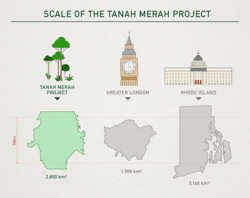Podcast: Who owns the companies destroying rainforests in the heart of New Guinea?
by Mike DiGirolamo
- New Guinea, home to the world’s third-largest rainforest, also contains the world’s largest planned oil palm plantation.
- Covering 2,800 square kilometers (1,100 square miles) the Tanah Merah project is nearly the size of the U.S. state of Rhode Island.
- However, the true owners of the seven concessions that make up the project remain hidden through a shroud of corporate secrecy.
- We speak with Philip Jacobson, senior editor at Mongabay, and Bonnie Sumner, investigative reporter at the Aotearoa New Zealand organization Newsroom, to discuss the project from inception to present day, the involvement of a New Zealand businessman, and where the project could go next.
The sixth episode of Mongabay Explores New Guinea shares what was learned from almost two years of investigative reporting by Mongabay, Malaysiakini, Tempo, Earthsight and The Gecko Project, plus what we now know about the Tanah Merah project — and still don’t know — including who owns this company that’s currently converting a giant swath of rainforest to oil palm plantations.
The Tanah Merah project, which sits in Boven Digoel district in the Indonesian half of New Guinea, threatens dense, primary rainforest at the heart of the giant island. If cleared, an area of tropical forest cover and Indigenous lands twice the size of greater London will be lost and release as much carbon as the U.S. state of Virginia produces by burning fossil fuels each year.
But who owns it?
No one knows for certain, as the project is divided into seven different concessions, each linked to a slew of corporations, some of which are housed in offshore secrecy jurisdictions that hide their true owners.
While the project has changed hands several times since its inception in 2007, three concessions are currently owned by Digoel Agri. We spoke with Bonnie Sumner from the news organization Newsroom, who was able to meet with New Zealand businessman Neville Mahon who, at the time of their interview, was listed as a majority shareholder of the three concessions owned by Digoel Agri.
We also spoke with Mongabay’s senior editor for Southeast Asia, Philip Jacobson, about the complex web of backdoor dealings, financial transactions, legal loopholes and policy implications of the project, and where the project stands today in light of the Indonesian government’s recent lifting of a moratorium on new palm oil permits.
Listen here:
https://news.mongabay.com/2022/04/podcast-who-owns-the-companies-destroying-rainforest-in-the-heart-of-new-guinea/













